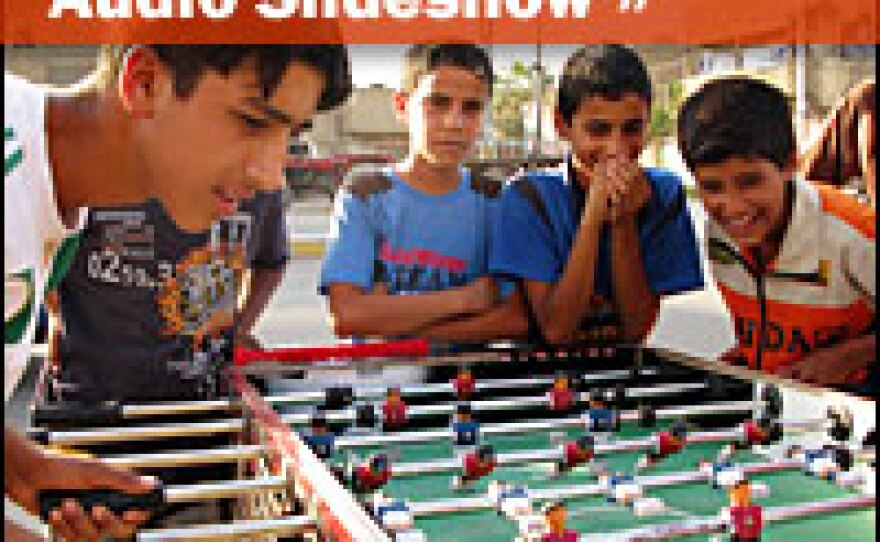
Sadr City is one of Baghdad's most notorious neighborhoods. It was once dominated for years by a radical Muslim cleric and his armed followers, who were determined to drive American forces out of Iraq. But in recent months, the black-clad gunmen have vanished from Sadr City.
They have been replaced by Iraqi soldiers and the occasional U.S. patrol, and they keep a respectful distance from the local population. The resulting calm has breathed new life into this war-ravaged slum, and residents are taking back their neighborhood.
On one particular day, a dozen Iraqi boys cram around a table soccer game that is under way along al Falah Street in Sadr City. They cheer on teenager Salah Abbas as he sends the ball flying toward his opponent's goal.
For the 16-year-old Abbas, this isn't just about having fun — it's about making money. He has been making quite a lot of it since fighting stopped on this street a few months back.
Abbas says that with his family's help, he bought his first table in June and set it up on the side of the street. He charged the equivalent of 40 cents per game to kids who wanted to play. Within two weeks, the teen says he earned enough money to buy two more tables.
Nowadays, the scores of boys who flock to his open-air arcade earn him a cool $25 per day. That's a hefty wage by Iraqi standards. He calls it a blessing from God — it's a view of life that's echoed by just about everyone here inside Sadr City's Golden Block.
By early evening, as the searing temperatures ease, the sidewalks are packed with people. Some of them are venturing out this summer for the first time in years. They shop or hawk goods, dine on falafel sandwiches or stop to chat with neighbors over tobacco they smoke through gurgling water pipes.
The economic and social boom in Sadr City is unlike anything I've seen since I started coming here five years ago. And I find no trace of the black-clad militia who used to lob mortars at American targets from these same sidewalks.
Instead, I find people like Mohammad Hadi Wadji, who sells fruit here at the Emraidi market. He says he used to dodge gunfire behind boxes piled up at his fruit stand. Now he's able to stand out front, haggling with customers.
American officials in Iraq credit the recently ended U.S. troop surge for the transformation in Baghdad neighborhoods like Sadr City.
But that's not how the Sadr City residents I interviewed see it. Most, like the fruit vendor speaking here, credit Muqtada al-Sadr for the quiet in their impoverished neighborhood.
He is the radical Shiite cleric whose father is the namesake for Sadr City. The younger Sadr also heads the Mahdi Army militiamen the Americans claim to have driven back.
Many people here believe it was Sadr's call for a cease-fire that led the gunmen to disappear, and they say they'll happily welcome them back — especially if it's to fight the Americans.
At a Friday rally outside Sadr's office, thousands of men echo the prayer leader's chants of "No to America" and "Yes to liberation."
Later, they set fire to a plastic tarp covered in American flags.
Copyright 2022 NPR. To see more, visit https://www.npr.org. 9(MDAzMjM2NDYzMDEyMzc1Njk5NjAxNzY3OQ001))






